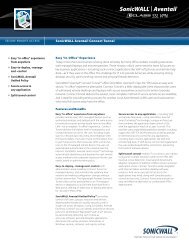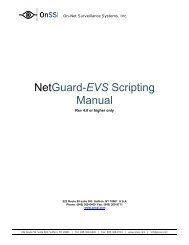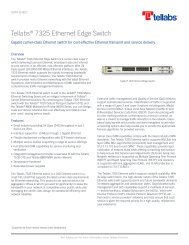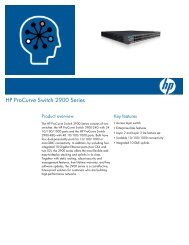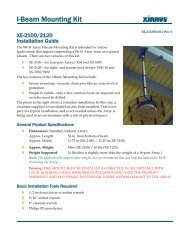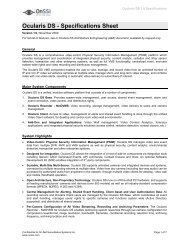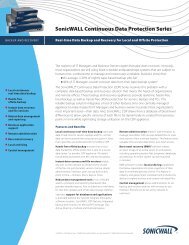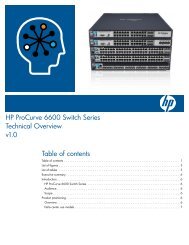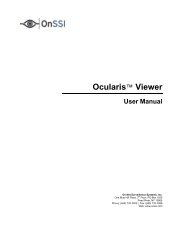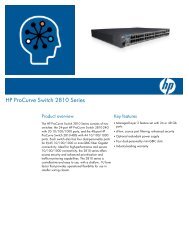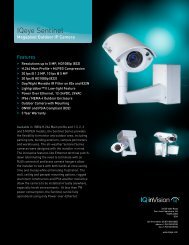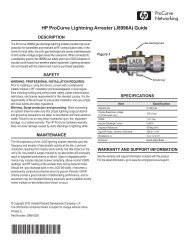HP ProCurve Networking Datasheets - Moonblink
HP ProCurve Networking Datasheets - Moonblink
HP ProCurve Networking Datasheets - Moonblink
Create successful ePaper yourself
Turn your PDF publications into a flip-book with our unique Google optimized e-Paper software.
<strong>HP</strong> <strong>ProCurve</strong> Network Access Controller 800<br />
Features and benefits<br />
Management<br />
• Centralized endpoint policy management: endpoint testing<br />
policies are centrally managed by a single management server<br />
and shared by up to ten enforcement servers<br />
• Administration console: a Web-based console provides an easyto-use<br />
interface for configuring endpoint policies and enforcement<br />
clusters as well as a dashboard-style interface for viewing the<br />
status of endpoint integrity testing<br />
• Default testing policies: default testing policies provide a great<br />
starting point for endpoint testing and can be easily utilized as<br />
the basis for custom testing policies<br />
• Network management server integration: the <strong>HP</strong> <strong>ProCurve</strong><br />
Network Access Controller 800 management server is discovered<br />
and monitored by the <strong>HP</strong> <strong>ProCurve</strong> Manager platform to enable<br />
unified device and security management; the Web-based<br />
administration console of the <strong>ProCurve</strong> Network Access<br />
Controller 800 is integrated into the <strong>ProCurve</strong> Manager display<br />
for a cohesive management experience<br />
Performance<br />
• Efficient endpoint testing: typical endpoint testing can be<br />
completed in less than ten seconds, avoiding lengthy wait times<br />
as endpoints are connected to the network<br />
• Support for up to 30,000 concurrent endpoints in one<br />
management domain: each enforcement server can support up<br />
to 3,000 endpoints, and one management server can control up<br />
to ten enforcement servers<br />
Resiliency and high availability<br />
• Enforcement server resiliency and redundancy: enable high<br />
network availability for mission-critical LAN deployments;<br />
enforcement servers continue to provide authentication and<br />
endpoint testing services in the absence of a management<br />
server and can be configured in clusters to provide redundancy<br />
and load-balancing for endpoint testing<br />
Security<br />
• Built-in RADIUS server: can perform authentication services or<br />
act as a proxy server for a remote RADIUS authentication service<br />
• Supports standard-based or a local authentication directory: can<br />
integrate with existing Active Directory or standard LDAP directory<br />
services or can host a local authentication directory for smaller<br />
environments<br />
• Endpoint integrity assessment: enables both pre-authentication<br />
and post-authentication testing of network-attached endpoints;<br />
includes an extensive set of built-in endpoint tests and is<br />
extensible to test for any prohibited or required software:<br />
– Operating system: versions, service pack levels, and hot fixes<br />
– Security settings: firewall, auto-update, and browser security<br />
settings<br />
– Security software: antivirus, antispyware, and firewalls<br />
– Malware: spyware, worms, viruses, and trojans<br />
– Applications: peer-to-peer and instant messaging software<br />
• Flexible enforcement modes: offer multiple enforcement modes<br />
that can be used together and centrally managed by a single<br />
management server to share endpoint policies and licenses:<br />
– RADIUS: integrates with RADIUS authentication to allow access<br />
only to authorized users and devices; uses RADIUS<br />
authorization capabilities to isolate endpoints for testing prior<br />
to providing complete network access and isolation of noncompliant<br />
endpoints<br />
– DHCP: integrates with DHCP servers to isolate and test<br />
endpoints before they are allowed to access production<br />
networks and interact with other network clients and resources<br />
– Inline: actively monitors a link for new endpoints and tests<br />
them before they are allowed to access the network; enables<br />
testing of remote endpoints connecting through a VPN<br />
concentrator<br />
• Flexible testing methods: enables endpoint testing that meets<br />
the broad needs of most businesses, including solutions for both<br />
managed and unmanaged endpoints:<br />
– Agent based: a permanent agent can be installed on endpoints<br />
to evaluate endpoint integrity status; it is the most efficient<br />
mode for managed endpoints that will continually connect to<br />
the network<br />
– Transient agent: an agent is temporarily downloaded to the<br />
endpoint to evaluate endpoint integrity, and then it enables<br />
unmanaged endpoints to be tested without the need to have<br />
an agent preloaded and remain on the endpoint<br />
– Agentless: uses administrative credentials for an endpoint<br />
along with native communications protocols to evaluate the<br />
endpoint integrity status; enables endpoints that are part of a<br />
managed domain or have known administrative credentials to<br />
be tested without ever loading an agent<br />
• Endpoint quarantine: policy-based enforcement allows for<br />
isolation of non-compliant endpoints<br />
275



